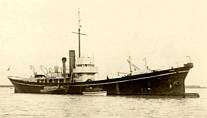A reader who calls himself “Classical Liberal” emailed us this morning with the following suggestion for combating piracy off the coast of Somalia:
 Perhaps it is time to revive the Q-ship concept. This was used in WWI to combat U-boats which were preying on allied shipping. As I recall, it was Winston Churchill’s idea.
Perhaps it is time to revive the Q-ship concept. This was used in WWI to combat U-boats which were preying on allied shipping. As I recall, it was Winston Churchill’s idea.
At the time torpedoes were expensive and not very dependable, so U-boat captains preferred to surface next to a civilian ship and sink it with the sub’s deck gun. This also allowed the ship’s passengers and crew time to abandon ship in the life boats.
The Q-ships were cargo ships equipped with deck guns which were disguised so that the ship seemed like an ordinary cargo vessel. When the U-boat surfaced next to it, the stuff placed in front of the guns as a disguise was dropped and the Q-ship’s guns easily shredded the thin-hulled U-boats. Unfortunately, this caused U-boat skippers to begin using their torpedoes to sink ships with no prior warning, increasing the loss of life.
- - - - - - - - - -
However, I don’t see this as a problem in the case of Somali pirates. They are motivated to capture the ship and crew, not merely sink them, and haven’t any choice but to approach their target ships on the surface anyway. After a few pirate boats are chewed to pieces (along with the pirates) I think the rest of the pirates might think twice about their career path.
Does anyone know what maritime law says about armed civilian ships using deadly force to defend themselves?
Perhaps it is time to revive the Q-ship concept. This was used in WWI to combat U-boats which were preying on allied shipping. As I recall, it was Winston Churchill’s idea.

4 comments:
According to Wikipedia, the U.S. has not ratified the U.N. Convention on Law of the Sea. As far as I know, Article I, Section 8 of the Constitution still authorizes Congress to issue letters of marque, i.e., to charter privateers. Not that anybody pays any attention to the Constitution nowadays.
Personally, I think that simple reprisals by aerial bombardment would be quicker and cheaper than Q-ships.
Gringo,
I'm not sure bombardment would be cheaper- you have the cost of the bombs, fuel, ground support facilities, etc. With the Q-ship concept, it's just a single cannon, a few shells, and a bit of crew training.
And it provides instant reinforcement of the "don't attack merchant ships" lesson.
Besides, this is friggin' Somalia. Who are you gonna bomb?
In combatting piracy, "Q-ships" would be permissable under US Maritime Law.
This section (http://frwebgate.access.gpo.gov/cgi-bin/getdoc.cgi?dbname=browse_usc&docid=Cite:+33USC383)gives full self defense rights against pirates and even allows aggression against them such as attacking them and taking away their ship.
This section (http://frwebgate.access.gpo.gov/cgi-bin/getdoc.cgi?dbname=browse_usc&docid=Cite:+10USC351) permits the President to authorize any of the armed forces to provide weaponry for civilian ships (as opposed to the owners footing the bill). Paragraph (b), if read carefully, shows that the President can do it pretty much whenever he feels it justified.
Touched on the topic here, with the following: "Using a Q-ship for anti-piracy work seems to me to be dubious proposition at best. Having a specially outfitted vessel means the element of surprise might easily be surrendered if the same ship "trawls" the same pirate-infested waters too frequently. Further, these modern pirates use small teams of men in small boats, which may be easily replaced by the "pirate kings" without risk of more expensive ships or the "brains" of the pirate operation. The costs of the operation of an anti-pirate Q-ship would be high, and it difficult to think of any entity that would step up to pay those costs, especially if there are less expensive options, including increasing crew awareness in high risk areas (read the reports- most attempted boardings of ships traveling through the Strait of Malacca are thwarted by alert crews armed with powerful fire hoses). In addition, since many pirate attacks take place in territorial waters, there is the question of having the legal right to respond to what is felt to be an attack while in a state's waters as opposed to being on the high seas." And we are not, generally, talking about U.S. flagged ships involved in these incidents off Somalia. I assume that most of the ship flagging countries reject the idea of armed merchant ships. Better for merchant ships to stay well off Somalia and/or to travel in convoys, escorted or not by warships.
Post a Comment